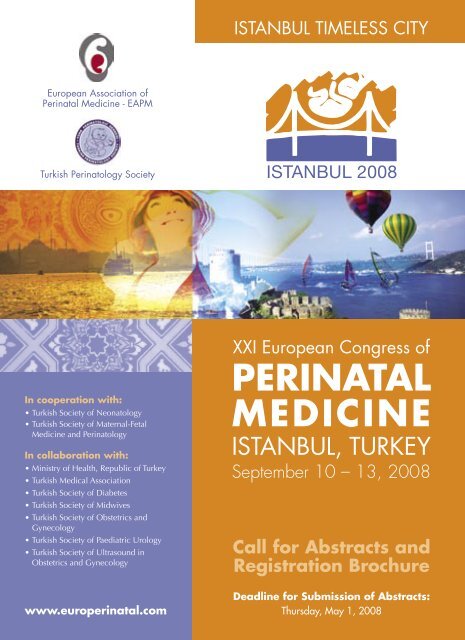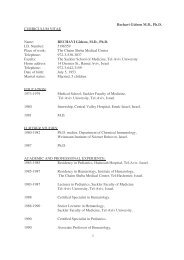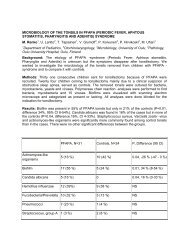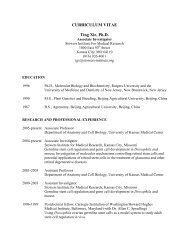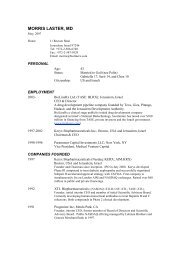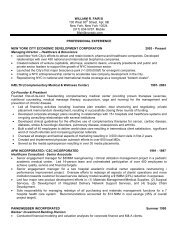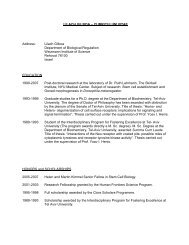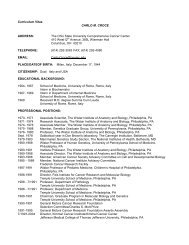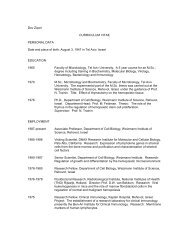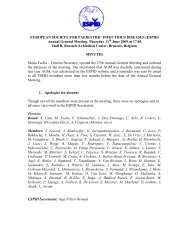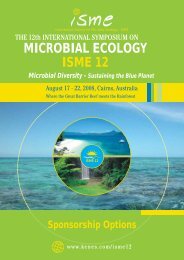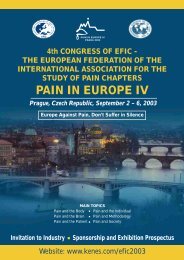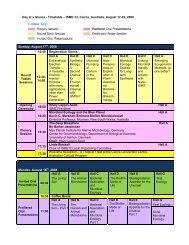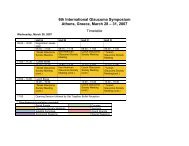PERINATAL MEDICINE
PERINATAL MEDICINE
PERINATAL MEDICINE
Create successful ePaper yourself
Turn your PDF publications into a flip-book with our unique Google optimized e-Paper software.
European Association of<br />
Perinatal Medicine - EAPM<br />
Turkish Perinatology Society<br />
In cooperation with:<br />
• Turkish Society of Neonatology<br />
• Turkish Society of Maternal-Fetal<br />
Medicine and Perinatology<br />
In collaboration with:<br />
• Ministry of Health, Republic of Turkey<br />
• Turkish Medical Association<br />
• Turkish Society of Diabetes<br />
• Turkish Society of Midwives<br />
• Turkish Society of Obstetrics and<br />
Gynecology<br />
• Turkish Society of Paediatric Urology<br />
• Turkish Society of Ultrasound in<br />
Obstetrics and Gynecology<br />
www.europerinatal.com<br />
ISTANBUL TIMELESS CITY<br />
XXI European Congress of<br />
<strong>PERINATAL</strong><br />
<strong>MEDICINE</strong><br />
ISTANBUL, TURKEY<br />
September 10 – 13, 2008<br />
Call for Abstracts and<br />
Registration Brochure<br />
Deadline for Submission of Abstracts:<br />
Thursday, May 1, 2008<br />
www.europerinatal.com 1
CONTENTS<br />
XXI EUROPEAN CONGRESS OF <strong>PERINATAL</strong> <strong>MEDICINE</strong><br />
Welcome from Congress President 3<br />
Welcome from EAPM President 4<br />
Committees 5<br />
About EAPM 6<br />
Preliminary Timetable 8<br />
Preliminary List of Speakers and Chairpersons 9<br />
Preliminary Programme 10<br />
Call for Abstracts 17<br />
Abstract Topics 18<br />
General Information 19<br />
Registration Fees and Social Events 20<br />
Accommodation 22<br />
2 CALL FOR ABSTRACTS AND REGISTRATION BROCHURE
Dear Colleagues,<br />
ISTANBUL, TURKEY, SEPTEMBER 10 – 13, 2008<br />
On behalf of the European Association of Perinatal Medicine<br />
and the Turkish Perinatology Society, it is a great pleasure<br />
to welcome you to Istanbul-Turkey for the occasion of the<br />
XXI European Congress of Perinatal Medicine.<br />
We are convinced that our scientific potential, combined with the professional<br />
facilities and infrastructure as well as the well-known Turkish hospitality and<br />
organisation talents, make Istanbul the cultural and economical centre in<br />
the region one of the best sites in Europe. Istanbul is an ideal location for a<br />
memorable congress of the European Association of Perinatal Medicine in the<br />
year 2008. As a country, Turkey and as a city, Istanbul bridges two continents. In<br />
this sense the European Congress of Perinatal Medicine in Istanbul may serve as<br />
an ideal scientific platform to exchange the scientific information and challenge<br />
between scientists and clinicians from the different countries.<br />
The congress centre, located in the modern business district of Harbiye has<br />
been renovated as Turkey’s largest congress centre. There is a wide range<br />
of accommodation in Istanbul, and all the major international hotels are<br />
represented, along with a large number of capable and highly professional<br />
organisers. Each hotel offers a rich blend of service and sophistication and is<br />
well equipped to meet the needs of visitor. Guests are welcomed and cared<br />
for in the grand and gracious traditions of hospitality that have made Istanbul<br />
famous for centuries. Genuine warmth and generosity are characteristic of the<br />
hospitality extended, since Turkish tradition declares that every traveller is a<br />
guest of God.<br />
A very large list of topics in perinatal medicine has been prepared for the<br />
congress. With keynote lectures and papers from different part of Europe and<br />
other countries, we are sure that you are going to have very friendly discussions,<br />
exchange ideas and share all your scientific work with others who are interested<br />
in perinatal medicine. Authors of some submitted abstracts will be offered the<br />
opportunity to present their important scientific work together with invited<br />
speakers as free communications in main sessions. These scientific papers will<br />
be selected by the Scientific Committee and the first author of the paper will<br />
be notified before the congress. There will also be poster viewing sessions and<br />
poster discussion sessions in the programme.<br />
We are looking forward to seeing you in Istanbul.<br />
Let’s meet for perinatal medicine where the continents meet in a timeless city,<br />
Istanbul!<br />
Yours sincerely,<br />
Prof. Cihat Şen<br />
Congress President, ECPM-2008<br />
President-Elect, EAPM<br />
www.europerinatal.com<br />
3
XXI EUROPEAN CONGRESS OF <strong>PERINATAL</strong> <strong>MEDICINE</strong><br />
EAPM PRESIDENT’S LETTER OF WELCOME<br />
It is my great pleasure to welcome you to the 21 st European<br />
Congress of Perinatal Medicine being held in Istanbul, Turkey<br />
from 10th to 13th October 2008. We have a full and varied<br />
scientific programme which we hope will be of interest to all<br />
our delegates.<br />
My thanks are due to Cihat Sen, the Congress President, Umberto Simeoni<br />
and his Scientific Committee and Kenes International for putting this excellent<br />
programme together in this beautiful city of Istanbul. Just as Istanbul is a bridge<br />
between 2 continents, the European Association of Perinatal Medicine should<br />
be a bridge between the 2 major disciplines of perinatal medicine – obstetrics<br />
(maternal fetal medicine) and paediatrics (neonatology). We also welcome<br />
our colleagues from other allied disciplines: perinatal pathology, genetics,<br />
epidemiology, midwifery, neonatal nursing, obstetric anaesthesia, paediatric<br />
surgery and all other subspecialties and hope that they benefit from the<br />
interdisciplinary sessions. This Congress we have tried to include sessions on<br />
Hot Topics and have asked leading speakers from around the world to help us<br />
set these up. You will learn more about the Cochrane Collaboration and hear<br />
the results of recent important clinical trials in Perinatal Medicine.<br />
We must not forget the major challenges that remain for those of us working in<br />
perinatal medicine. Perhaps the greatest of these is the provision of evidencebased<br />
healthcare to mothers and babies in the developing world. This needs<br />
both the expertise of doctors and nurses but also political and governmental<br />
support. We must continue to lobby for this support and ensure that closer to<br />
home our endeavours match up to the highest levels of scientific integrity when<br />
scrutinised by others. The European Association of Perinatal Medicine, which<br />
means its members, must strive to raise and maintain its profile and standing<br />
throughout the scientific world. These challenges are not insurmountable but<br />
will require determined and focussed effort from all quarters.<br />
I hope you have a very pleasant visit to Istanbul enjoying both the quality of the<br />
scientific programme and the beauty and excitement of this fascinating city.<br />
Henry L Halliday<br />
President of EAPM<br />
4 CALL FOR ABSTRACTS AND REGISTRATION BROCHURE
COMMITTEES<br />
ISTANBUL, TURKEY, SEPTEMBER 10 – 13, 2008<br />
European Congress of Perinatal Medicine<br />
Committee 2008<br />
Congress President: Cihat S ̧en Congress Secretary: Nilgün Kültürsay<br />
European Association<br />
of Perinatal Medicine<br />
OFFICERS 2006 - 2008<br />
EXECUTIVE BOARD<br />
President Henry Halliday<br />
President Elect Cihat S ̧en<br />
Past President Aris Antsaklis<br />
Secretary Yves Ville<br />
Treasurer Grzegorz Breborowicz<br />
Members Moshe Hod<br />
The Hung Bui<br />
Peter Zoban<br />
Marietta Xanthou<br />
Executive Director Gian Carlo Di Renzo<br />
COMMITTEES<br />
Scientific Committee<br />
Umberto Simeoni – Chairman<br />
Apostolos Athanassiadis<br />
Fabio Facchinetti<br />
Malcom Levene<br />
Anton Mikhailov<br />
Jan Nijhuis<br />
Adolf Vall y Soler<br />
Christian Speer<br />
Florin Stamatian<br />
Marta Szymankiewicz<br />
Educational Committee<br />
Gian Carlo Di Renzo – Chairman<br />
Krissa Bakoula<br />
Kubilay Ertan<br />
Zdenek Hajek<br />
Dominique Haumont<br />
Asim Kurjak<br />
Kypros Nicolaides<br />
Nebojsa Radunovic<br />
Aydin Tekay<br />
Murat Yayla<br />
Turkish Society<br />
of Perinatal Medicine<br />
EXECUTIVE BOARD<br />
President Turgay Şener<br />
President Elect Ayse Kafkaslı<br />
Past President Cihat Şen<br />
Secretary Özgür Deren<br />
Treasurer Murat Yayla<br />
Members Yeşim Baytur<br />
Ali Ergün<br />
Riza Madazlı<br />
Lütfü Önderoğlu<br />
COMMITTEES<br />
Local Scientific Committee<br />
Turgay Sener – Chairman<br />
Arif Akşit<br />
Saadet Arsan<br />
Sinan Beksaç<br />
Nur Danişmend<br />
Cansun Demir<br />
Hasan ilkova<br />
Oktay Kadayifçi<br />
Eren Özek<br />
Vildan Ocak<br />
Semih Özeren<br />
Yildiz Perk<br />
Yunus Söylet<br />
Gülsevin Tekinalp<br />
Bülent Tıraş<br />
Temel Yilmaz<br />
Seyfettin Uludağ<br />
Murat Yurdakök<br />
Atıl Yüksel<br />
Social Committee<br />
Ercüment Cengiz – Chairman<br />
Bahar Gökşin<br />
Figen Şen<br />
www.europerinatal.com<br />
5
ABOUT EAPM<br />
XXI EUROPEAN CONGRESS OF <strong>PERINATAL</strong> <strong>MEDICINE</strong><br />
Extract from ‘Subspecialization in Perinatal Medicine’.<br />
Full text available at www.europerinatal.com<br />
Subspecialization in Perinatal Medicine<br />
The management of high risk pregnancies and fetal<br />
pathology is a frequent problem and antenatal<br />
diagnosis increasingly requires a multidisciplinary<br />
approach. In some cases, it will require the<br />
involvement of an individual who has had special<br />
training in feto-maternal and neo-natal physiology and<br />
pathology as well as genetics, embryology, fetal and<br />
maternal screening and diagnostic procedures and<br />
perinatal care and counselling. EBCOG notes with<br />
approval the development of subspecialty practices in<br />
a number of countries and considers that feto-maternal<br />
medicine should be recognised as a subspecialty, in<br />
Europe. Educational objectives and requirements for<br />
training in these subspecialist areas have been defined<br />
in conjunction with acknowledged experts from the<br />
European Association of Perinatal Medicine (EAPM) and<br />
are defined in the syllabus. The role of a subspecialist is<br />
complementary to, and not in competition with, that of<br />
the specialist in Obstetrics and Gynaecology.<br />
Training of the Feto-Maternal Medicine<br />
subspecialist:<br />
1. Definition: The Feto-Maternal and Perinatal<br />
Subspecialist is a specialist in Obstetrics and<br />
Gynaecology who has had a theoretical and<br />
practical training in:<br />
a. detailed risk assessment before during and after<br />
pregnancy;<br />
b. ante-natal diagnosis of the wide range of<br />
materno-fetal disorders, some of which may<br />
require an invasive procedure;<br />
c. management of very high risks pregnancies<br />
during the ante-natal , intra-partum , and post<br />
partum period.<br />
The practice of feto-maternal and perinatal medicine<br />
excludes the subspecialist from training and practice<br />
in another subspecialty<br />
5. The means of training<br />
5.1 Entry requirements: a recognised specialist<br />
qualification in Obstetrics and Gynaecology or have<br />
completed a minimum of five years in an approved<br />
training programme in Obstetrics and Gynaecology,<br />
the availability of a recognised training post<br />
5.2 For each country, the estimated number of training<br />
posts should reflect the national need for subspecialists<br />
in feto-maternal and perinatal medicine, as well as the<br />
facilities and finance available for training<br />
6 CALL FOR ABSTRACTS AND REGISTRATION BROCHURE<br />
5.3 Arrangements for postgraduate training must be<br />
compatible with national employment and teaching<br />
legislation in relation to remuneration, hours of work<br />
and rights of employees in such matters as sick leave,<br />
maternal and paternal leave and compulsory military<br />
service.<br />
5.4 The duration of subspecialty training should<br />
include a minimum of two years in an approved<br />
programme and should cover the clinical and research<br />
aspects of the following areas: Ultrasound and other<br />
imaging procedures –Genetics–Neonatology - Maternal<br />
and Fetal Surveillance in high risk pregnancies - Basic<br />
Science e.g. maternal and fetal physiology, histopathology<br />
and embryology - Counselling.<br />
5.5 Training should be structured throughout with<br />
clearly defined targets<br />
5.6 A trainee may spend some training time in<br />
another (1 or 2) centre(s) recognised by<br />
EAPM, after approved by the appropriate national<br />
committee.<br />
6. Assessment of training<br />
6.1 In all European countries, approval of training and<br />
trainers should be the responsibility of a national or<br />
regional authority which has the power to withdraw<br />
recognition, if necessary.<br />
6.2 Approval of a training centre should be based on:<br />
annual statistics - internal quality control and audit -<br />
organised teaching sessions - availability of a clinical<br />
genetics unit, intensive neonatal care unit, neonatal<br />
surgical unit, adult intensive care unit, designated<br />
place for caring for severely ill women, perinatal<br />
pathologist, multi-disciplinary team regularly involved<br />
in the management of high risk pregnancies, fulfilment<br />
of defined criteria for minimum activity for each trainee<br />
per year: 200 supervised high risk pregnancies and<br />
deliveries - 200 advanced ultrasound examinations -<br />
200 fetal invasive procedures (amniocentesis, chorion<br />
villus sampling, fetal blood sampling).<br />
6.3 Assessment of the trainee should be carried out by<br />
a national or federal committee of experts and should<br />
take into consideration: participation in Feto-Maternal<br />
Medicine courses, in particular those recognised<br />
by EBCOG, advised by the European Association of<br />
Perinatal medicine ( EAPM), completion of a Log Book<br />
of clinical experience in Feto-Maternal Medicine,<br />
peer review publications in a nationally recognised<br />
journal.<br />
6.4 A representative from the EBCOG may be an<br />
observer on the national or federal assessment<br />
committee.<br />
6.5 EAPM in conjunction with EBCOG organises an<br />
evaluation visit to a subspecialist unit, if requested.<br />
ECPM President, Prof. Cihat Sen<br />
Rumeli cad 19/7 Nisantaşı, Istanbul – 34301, Turkey. Email: csen@europerinatal.com
EAPM<br />
EUROPEAN<br />
ASSOCIATION<br />
OF <strong>PERINATAL</strong><br />
<strong>MEDICINE</strong><br />
The European Association of Perinatal Medicine (EAPM)<br />
is bringing together groups and individuals in order to<br />
promote the science of perinatal medicine for the benefit<br />
of a high level of physical and mental health for women,<br />
mothers and their children in Europe. Your EAPM<br />
membership could involve you in different disciplines in<br />
perinatal care as well as meet colleagues from European<br />
countries.<br />
Want to become a member?<br />
Please visit our site for more information<br />
www.europerinatal.com<br />
EAPM Administrative Office<br />
c/o Kenes International<br />
1-3 Rue de Chantepoulet, P.O.Box 1726, CH-1211 Geneva 1, Switzerland<br />
Tel: +41 22 908 04 82, Fax: +41 22 732 26 07, www.europerinatal.com<br />
7
XXI EUROPEAN CONGRESS OF <strong>PERINATAL</strong> <strong>MEDICINE</strong><br />
PRELIMINARY TIMETABLE<br />
WEDNESDAY, SEPTEMBER, 10, 2008<br />
10.00 - 17.00 Pre-Congress Courses (see page 10)<br />
17.30 - 18.30 Opening Lectures<br />
18.00 - 20.00 Opening Ceremony<br />
20.00 - 22.30 Welcome Reception<br />
THURSDAY, SEPTEMBER 11, 2008<br />
09.00 - 10.30 Plenary Lectures<br />
11.00 - 12.30 Symposia<br />
12.30 - 14.30 Lunch Break<br />
14.30 - 16.15 Parallel Sessions<br />
16.45 - 18.30 Parallel Sessions<br />
FRIDAY, SEPTEMBER 12, 2008<br />
09.00 - 10.30 Plenary Lectures<br />
11.00 - 12.30 Symposia<br />
12.30 - 14.30 Lunch Break<br />
14.30 - 16.15 Parallel Sessions<br />
16.45 - 18.30 Parallel Sessions<br />
20.00 GALA DINNER<br />
SATURDAY, SEPTEMBER 13, 2008<br />
09.00 - 10.30 Plenary Lectures<br />
11.00 - 12.30 Symposia<br />
12.30 - 14.30 Lunch Break<br />
14.30 - 16.15 Parallel Sessions<br />
16.45 - 18.30 Parallel Sessions<br />
8 CALL FOR ABSTRACTS AND REGISTRATION BROCHURE
ISTANBUL, TURKEY, SEPTEMBER 10 – 13, 2008<br />
PRELIMINARY LIST OF SPEAKERS<br />
AND CHAIRPERSONS<br />
R. Achiron, Israel<br />
A. Adra, Lebanon<br />
Z. Alfirevic, UK<br />
A. Akşit, Turkey<br />
JV Anker, USA<br />
A. Antsaklis, Greece<br />
S. Arsan, Turkey<br />
S. Arulkumaran, UK<br />
A. Athanassiadis, Greece<br />
B. Arenas, Spain<br />
A. Baschat, USA<br />
i. Başer, Turkey<br />
Y. Baytur, Turkey<br />
S. Beksac, Turkey<br />
G. Bevilacqua, Italy<br />
G. Breborowicz, Poland<br />
A. Brice, France<br />
T.H. Bui, Sweden<br />
L. Cabero-Roura, Spain<br />
X. Carbonell, Spain<br />
V. Carnielli, Italy<br />
M. Carrapato, Portugal<br />
J.M. Carrera, Spain<br />
J. Carvalho, UK<br />
A. Çelenk, Turkey<br />
F.A. Chervenak, USA<br />
G. Clerici, Italy<br />
V. D’Addario, Italy<br />
N. Danişment, Turkey<br />
G. Daskalakis, Greece<br />
N. Demir, Turkey<br />
J. Deprest, Belgium<br />
Ö. Deren, Turkey<br />
G.C. Di Renzo, Italy<br />
G.P. Donzelli, Italy<br />
T. Duan, China<br />
J. Dudenhausen, Germany<br />
W. Dunlop, UK<br />
S. Eiknes, Norway<br />
A. Ergün, Turkey<br />
R. Erkkola, Finland<br />
K. Ertan, Germany<br />
M. Evans, USA<br />
F. Facchinetti, Italy<br />
Z. Fatusic, Bosnia & Herzegovina<br />
R. Frazer, UK<br />
M. Gallo, Spain<br />
U. Gembruch, Germany<br />
L. Gortner, Germany<br />
E. Gratacos, Spain<br />
A. Greenough, UK<br />
J. Jenkins, UK<br />
D. Jurkovic, UK<br />
H. Hagberg, Denmark<br />
Z. Hajek, Czech Republic<br />
H. Halliday, UK<br />
D. Haumont, Belgium<br />
K. Hecher, Germany<br />
M. Hod, Israel<br />
W. Holzgreve, Switzerland<br />
P. Husslein, Austria<br />
M. Ivanisevic, Croatia<br />
O. Kadayıfçı, Turkey<br />
A. Kafkaslı, Turkey<br />
Ö. Kandemir, Turkey<br />
H. Karlberg, Sweden<br />
K. Khan, UK<br />
O. Kilavuz, Germany<br />
Y. Kimya, Turkey<br />
A. Koç, Turkey<br />
E. Koç, Turkey<br />
K. Kuczkowski, USA<br />
N. Kültürsay, Turkey<br />
M. Künhert, Germany<br />
A. Kurjak, Croatia<br />
R. Laurini, Norway<br />
C. Lees, UK<br />
N. Marlow, UK<br />
D. Maulik, USA<br />
I. Meizner, Israel<br />
A. Mikhailov, Russia<br />
N. Modi, UK<br />
M. Momtaz, Egypt<br />
G. Monni, Italy<br />
NT. Neto, Portugal<br />
K. Nicolaides, UK<br />
G. Nigro, Italy<br />
J. Nijhuis, The Netherlands<br />
Z. Novak Antolic, Slovenia<br />
V. Ocak, Turkey<br />
C. O’Herlihy, Ireland<br />
N. Oygür, Turkey<br />
L. Önderog¨lu, Turkey<br />
E. Özek, Turkey<br />
D. Paladini, Italy<br />
N. Papadogiannakis, Sweden<br />
A. Papageorghiou, UK<br />
N. Papantoniou, Greece<br />
A. Papitashvilli, Georgia<br />
Y. Perk, Turkey<br />
R. Pooh, Japan<br />
A. Puertas, Spain<br />
R. Quintero, USA<br />
N. Radunovic, Serbia<br />
G. Rizzo, Italy<br />
R. Romero, USA<br />
E. Saliba, France<br />
E. Saling, Germany<br />
O. Saugstad, Norway<br />
K.T.M. Schneider, Germany<br />
M. Schimmel, Israel<br />
T. Şener, Turkey<br />
B. Serra, Spain<br />
U. Simeoni, France<br />
R. Soll, USA<br />
Y. Söylet, Turkey<br />
C. Speer, Germany<br />
M. Stanojevic, Croatia<br />
P. Steer, UK<br />
T. Stefos, Greece<br />
F. Stamatian, Romania<br />
M. Szymankiewicz, Poland<br />
A. Tabor, Denmark<br />
R.C. Tasker, UK<br />
A. Tekay, Finland<br />
B. Thilaganathan, UK<br />
I. Timor-Trisch, USA<br />
A. Thachenko, Ukraine<br />
J. Troyano, Spain<br />
S. Ural, USA<br />
A. Ugwumadu, UK<br />
A. Vals y Soler, Spain<br />
D. Vaiman, France<br />
E. Vergahen, The Netherlands<br />
Y. Ville, France<br />
G. Visser, The Netherlands<br />
R. Vladareanu, Romania<br />
A. Wahed, Jordan<br />
J. Wladimiroff, The Netherlands<br />
M. Xanthou, Greece<br />
M. Yayla, Turkey<br />
M. Yurdakök, Turkey<br />
A. Yüksel, Turkey<br />
Y. Zalel, Israel<br />
P. Zoban, Czech Republic<br />
www.europerinatal.com<br />
9
XXI EUROPEAN CONGRESS OF <strong>PERINATAL</strong> <strong>MEDICINE</strong><br />
PRELIMINARY PROGRAMME<br />
PRE-CONGRESS COURSES - WEDNESDAY, SEPTEMBER 10, 2008<br />
Registration to courses is limited and pre-registration is required. Please see<br />
pages 20 and 21 for further information.<br />
Morning Courses (10:00 – 13:00)<br />
Course 1: Advanced Ultrasound – FMF Course<br />
• Genetics: Epidemiology and fetal diagnosis<br />
• Fetal Heart: Routine and targeted<br />
• 11-14 weeks: Anatomy and screening<br />
• Screening of Preterm Delivery<br />
• Screening of pre-eclampsia<br />
• IUGR: Prediction and Management<br />
Course 2: Intrapartum Management<br />
• Template for the definition of intrapartum hypoxia<br />
• The role of fetal blood sampling and acid base balance<br />
• Fetal ECG waveform analysis in intrapartum fetal monitoring<br />
• The role of fetal pulse-oximetry<br />
• Special situations such as pyrexia, meconium, oxytocin infusion<br />
• Monitoring the fetus at risk in labour (e.g. IUGR, Preterm labour, Diabetic<br />
mother)<br />
• Medico-legal considerations<br />
• Anesthesia-analgesia in labour<br />
Course 3: Delivery room resuscitation: Evidence-based approach<br />
• Delivery room resuscitation - past - present - future<br />
• Hypo-hypertermia in delivery room<br />
• Non-initiation and discontinuation of resuscitation<br />
• Treatment of hypotension-drugs and/or volume resuscitation<br />
• Drugs in neonatal resuscitation<br />
• MSAF- how to approach?<br />
• Laringeal masks and CPAP in resuscitation<br />
Course 4: Neonatal brain disorders - early diagnostic and therapeutic<br />
approach<br />
• Intrauterine infections and developing brain<br />
• Neuroprotection from asphyxia: Drugs, hypothermia<br />
• Cranial ultrasound - the role and limitations<br />
• Cerebral function monitors<br />
• New neuroimaging techniques<br />
• Neurological follow-up<br />
10 CALL FOR ABSTRACTS AND REGISTRATION BROCHURE
ISTANBUL, TURKEY, SEPTEMBER 10 – 13, 2008<br />
Afternoon Courses (14:00 – 17:00)<br />
Course 5: Fetal Cardiology<br />
• Fetal echo doppler for early detection of congenital heart block<br />
• Which fetal anomaly is indication for pregnancy termination and which is<br />
not?<br />
• Meaning of four chamber view?<br />
• Great vessels are easy to show up?<br />
• What is routine heart examination for Obstetricians?<br />
• AVSD? VSD?<br />
• Asymmetry of ventricles in the heart<br />
• Antenatal diagnosis of coarctation: role of new imaging techniques<br />
• Heart anomaly and chromosomal anomalies<br />
Course 6: Surfactant use and mechanical ventilation: new approaches<br />
• Surfactant use in neonate<br />
• CPAP and non-invasive ventilation<br />
• Volume targeted and volume guarantee ventilation<br />
• Pressure support ventilation<br />
• Real time pulmonary graphics<br />
• High frequency ventilation - evidence based recommendations<br />
• Weaning strategies, failure to extubate<br />
Course 7: Neonatal emergencies<br />
• Antenatal and intrapartum diagnosis of asphyxia<br />
• Postnatal management of asphyctic infant<br />
• Metabolic emergencies<br />
• Diagnosis and management of neonatal seizures<br />
• Management of cyanotic baby<br />
• Management of renal failure<br />
• The bleeding neonate<br />
PLENARY LECTURES<br />
Plenary Lectures I<br />
• Prematurity Prevention - an update<br />
• The role of progesterone in pregnancy maintenance<br />
• Prenatal infections and consequences for the newborn<br />
Plenary Lectures II<br />
• Outcome for disadvantaged first-time mothers: The Moment Study<br />
• Can ultrasound change the behaviour of the doctors in labor ward?<br />
• Are low birth weight infants at increased risk for cardio-vascular and<br />
metabolic diseases in adulthood? What we know and don't know<br />
Plenary Lectures III<br />
• Rapid aneuploidy diagnosis in prenatal diagnosis<br />
• Why the Groningen protocol should not be implemented by perinatologists<br />
• Prediction of Pre-eclampsia: First Trimester Screening<br />
www.europerinatal.com<br />
11
XXI EUROPEAN CONGRESS OF <strong>PERINATAL</strong> <strong>MEDICINE</strong><br />
PRELIMINARY PROGRAMME (cont.)<br />
SYMPOSIA<br />
Intrapartum Management<br />
• ECG waveform analysis in labour - where are we today<br />
• CTG and medico-legal issues<br />
• Oxygen administration for the preterm infant in the delivery room and beyond<br />
• Anesthesia-analgesia in labour<br />
• Induction of labour and its consequences<br />
Cerebral Palsy<br />
• Antenatal contribution: Infectious diseases in pregnancy and cerebral palsy<br />
• Intrapartum contribution of the STAN study<br />
• Genetic contribution<br />
• Antenatal contribution<br />
• Intrapartum contribution<br />
• Neonatal contribution<br />
Perinatal Infections<br />
• Infectious diseases in perinatal medicine<br />
• Maternal viral infections and the newborn<br />
• Chorioamnionitis: Fetal and neonatal consequences?<br />
• Infections and threatened abortion-labour<br />
PARALLEL SESSIONS<br />
All Parallel Sessions will include invited presentations and 3 free<br />
communications chosen from the submitted abstracts.<br />
Maternal morbidity and mortality<br />
• Maternal mortality in the world: the real challenge<br />
• HAPO Study - Hyperglycemia and adverse pregnancy outcome<br />
• Gestational thyroid disease; when to start treatment<br />
• Obstetric anaesthesia and perinatal medicine: is there a missing link?<br />
Fetal mortality and morbidity<br />
• Placenta and stillbirths<br />
• Microdeletion syndromes: An overview<br />
• Heavy metals and neural tube defects<br />
• Daily iatrogenic teratology: drugs, alcohol, smoking…<br />
• Neonatal clinical pharmacology: the science investigating the interface<br />
between development and pharmacogenetics<br />
Prematurity<br />
• Prevention of preterm delivery: Is it routinely available to everyone?<br />
• Management of acute preterm labour<br />
• 17 hydroxy progesterone after a successful acute tocolysis<br />
• New markers in detection of inflammation in PPROM<br />
12 CALL FOR ABSTRACTS AND REGISTRATION BROCHURE
ISTANBUL, TURKEY, SEPTEMBER 10 – 13, 2008<br />
IUGR<br />
• Management of IUGR: TRUFFLE results<br />
• Hypertensive and normotensive IUGR and ultrasound Doppler<br />
• Diagnosis and management of IUGR<br />
• Acute problems of IUGR neonate<br />
• Epigenetical alteration in the IUGR placenta<br />
Multiple Pregnancies (1)<br />
• Fetal reduction and late termination of pregnancy: How far should we go?<br />
• Hot topics on multiple pregnancies<br />
• Twin pregnancy: The choice of optimal route of delivery<br />
• Placental examination in multiples<br />
Multiple Pregnancies (2)<br />
• Laser therapy in TTTS and TRAP<br />
• Diagnosis and therapy of TTTS<br />
• Management of severe IUGR in one monochorionic twin<br />
Pre-eclampsia<br />
• Placental functional pathology in pre-eclampsia<br />
• The pathophysiology of trophoblast invasion in causing pre-eclampsia<br />
• Proteomics for prediction of pre-eclampsia<br />
• Maternal mortality and morbidity in pre-eclamptic women<br />
• Anesthesia and analgesia in pre-eclamptic women<br />
What is new in perinatal genetics (1)<br />
• New insights into modern prenatal genetics<br />
• Proteomics and genomics<br />
• Diagnosis of fetal disorders from maternal blood<br />
What is new in perinatal genetics (2)<br />
• Confined placental mosaicism and intrauterine growth restriction<br />
• Maternal microchimerism in human pregnancy<br />
• Microdeletion syndromes: An overview<br />
Perinatal Cardiology<br />
• What is routine ultrasound examination for fetal heart<br />
• Fetal ECHO in first trimester<br />
• Fetal ECO in second trimester<br />
• 4D fetal echocardiography in the study of structural and functional cardiac<br />
diseases<br />
Do we practice evidence-based medicine?<br />
• The Cochrane Reviews and actual Obstetric practice<br />
• The Cochrane Reviews and actual Neonatal practice<br />
Fetal anomalies (1)<br />
• Prenatal and postnatal diagnostic aids: US, CT, MRI, biopsies etc.<br />
• Prenatal Imaging (US and MRI) and cerebral development<br />
• Up-to-date Fetal Neuroimaging<br />
www.europerinatal.com<br />
13
XXI EUROPEAN CONGRESS OF <strong>PERINATAL</strong> <strong>MEDICINE</strong><br />
PRELIMINARY PROGRAMME (cont.)<br />
Fetal anomalies (2)<br />
• Postnatal Neurological Prognosis of CNS Abnormalities with Accurate<br />
Prenatal Detection<br />
• Fetoscopic surgery: an update<br />
• Fetal obstructive uropathy: is urine or amniotic fluid sampling useful for<br />
prenatal counselling?<br />
Down Syndrome (1)<br />
• Social aspects<br />
• Fetal malformations during NT screening<br />
• What is optimal screening method for Down<br />
• The effect of introducing first trimester combined screening for Down’s<br />
syndrome at a national level<br />
Down Syndrome (2)<br />
• NT, NB, DV, and TR: How applicable and effective?<br />
• An essential dimension of risk assessment and invasive genetic diagnosis<br />
• CVS and amniocentesis - what are the real risks?<br />
Caesarean section<br />
• Trial of labor after caesarean section<br />
• Caesarean section on demand and consequences<br />
• Breech delivery and C/S<br />
Maternal and neonatal problems (1)<br />
• Thromboembolic diseases in pregnancy, intra- and post partum<br />
• Neonatal problems in antiphopholipid syndrome<br />
• Antiphospholipid Syndrome<br />
• Thromboembolic problems in neonate<br />
Maternal and neonatal problems (2)<br />
• Hypothyroidism in pregnancy<br />
• Management of postpartum haemorrhage<br />
• Surgical treatment of post-partum haemorrhage<br />
Perinatal problems in infertility cases (1)<br />
• Induction protocols and perinatal consequences<br />
• Infertility drugs and prevalence of genetic disorders<br />
• ART technologies and prevalence of genetic disorders<br />
Perinatal problems in infertility cases (2)<br />
• Counseling of infertility cases for pregnancy outcome<br />
• ART and PGD: Impact on the fetus and neonate<br />
ELBW (1)<br />
• Neurological and cognitive development of ELBW infants<br />
• Delivery room management and transport to NICU<br />
• Prevention and treatment of NEC<br />
14 CALL FOR ABSTRACTS AND REGISTRATION BROCHURE
ISTANBUL, TURKEY, SEPTEMBER 10 – 13, 2008<br />
ELBW (2)<br />
• Increasing birth rate of ELBW infants and impact on their long-term outcome:<br />
Czech national data<br />
• Soft care in NICU – How can we take care of them less invasively and less<br />
disturbingly?<br />
• EuroNeoStat: an information system to monitor outcomes in VLBW infants<br />
End of life decision (1)<br />
• NIDCAP and end of life decisions<br />
• When a newborn is bound to die<br />
• The Groningen protocol: how and why<br />
End of life decision (2)<br />
• Perinatal care in extremely preterm age<br />
• Dilemmas regarding decision-making in newborn at the limits of viability (22-<br />
23 weeks)<br />
• Ethics and epidemiologic data at the threshold of viability<br />
Ethics<br />
• Ethics in neonatal medicine<br />
• No newborn should ever die alone<br />
• End of life decision-making in newborns: How far should we go?<br />
• Equilibrium between maternal and fetal rights<br />
• Fetal reduction and late termination of pregnancy. How far should we go?<br />
Workshop<br />
• A declaration concerning maternal and fetal rights<br />
Neonatal Brain (1)<br />
• Is 3D ultrasound useful in the diagnostic of neonatal brain?<br />
• Prevention or repair of brain damage<br />
• IVH-PVL: are they preventable?<br />
• Brain injury in near-term infants<br />
Neonatal Brain (2)<br />
• Maternal infections and prematurity<br />
• Development of innate immune system<br />
• Diagnosis of bacterial infection in neonate<br />
• Guidelines for selection of antibacterial therapy<br />
• Infection control and surveillance in NICU<br />
Neonatal RDS and Surfactant (1)<br />
• Pulmonary surfactant pharmacokinetics<br />
• Surfactant therapy: Prophylaxis vs. rescue<br />
• Surfactant treatment in RDS<br />
Neonatal RDS and Surfactant (2)<br />
• Genetic disorders of surfactant structure and function<br />
• New therapeutic applications of surfactant<br />
• Conventional versus new ventilatory strategies in RDS patients?<br />
www.europerinatal.com<br />
15
XXI EUROPEAN CONGRESS OF <strong>PERINATAL</strong> <strong>MEDICINE</strong><br />
PRELIMINARY PROGRAMME (cont.)<br />
Neonatal RDS and Surfactant (3)<br />
• Single or repeat antenatal steroids<br />
• CPAP and RDS Epicure Study<br />
• New concepts about bronchopulmonary dysplasia<br />
Neonatal RDS and Surfactant (4)<br />
• Iatrogenic events and quality improvement programmes in neonatal care<br />
• RDS in near term infants<br />
• Impact of antenatal and postnatal results/interventions on respiratory outcome<br />
Neonatal cardiac problems<br />
• Arythmias and abnormal heart rate<br />
• How to suspect and diagnose a cardiac baby in delivery room and NICU?<br />
• Stabilization and invasive cardiac procedures in neonate<br />
• Patent ductus arteriosus in preterm infant<br />
• Blood pressure problems: Hypo-hypertension<br />
Nutrition of preterm infant (1)<br />
• Early aggressive parenteral nutrition<br />
• Early aggressive enteral nutrition<br />
• Immunonutrition in neonate<br />
• Postdischarge nutrition<br />
Nutrition of preterm infant (2)<br />
• Promotion of breastfeeding in NICU<br />
• Catch-up or not to catch-up?<br />
• Early origins of adult diseases<br />
Screening Tests - European Experience (1)<br />
• Metabolic screening tests-today and tomorrow<br />
• How to suspect and diagnose a baby with metabolic disorders?<br />
Screening Tests - European Experience (2)<br />
• Hearing tests<br />
• Developmental hip dysplasia<br />
• Different strategies in screening hypotiroidism<br />
Neonatal Infections (1)<br />
• Immunological/inflammatory mechanisms in neonates<br />
• Diagnosis of bacterial infection in neonate<br />
Neonatal Infections (2)<br />
• Guidelines for selection of antibacterial therapy<br />
• Infection control and surveillance in NICU<br />
16 CALL FOR ABSTRACTS AND REGISTRATION BROCHURE
ISTANBUL, TURKEY, SEPTEMBER 10 – 13, 2008<br />
CALL FOR ABSTRACTS<br />
Deadline for the submission of abstracts: Thursday, May 1, 2008<br />
Participants who would like to present an oral or poster presentation must submit<br />
an abstract for consideration by the Scientific Committee. The abstracts should be<br />
submitted in English and arrive no later than Thursday, May 1, 2008.<br />
The Scientific Committee will determine whether abstracts will be accepted<br />
as oral or poster presentations, with consideration to be given to the author’s<br />
preference. Authors of some submitted abstracts will be offered the opportunity<br />
to present their important scientific work together with invited speakers as free<br />
communications in main sessions. These scientific papers will be selected by<br />
the Scientific Committee and the first author of the paper will be notified before<br />
the congress. There will also be poster viewing sessions and poster discussion<br />
sessions in the programme.<br />
Highest scoring oral presentation will be included in the main session together<br />
with invited speakers<br />
The presenting author is required to ensure that all co-authors are aware of the<br />
content of the abstract before submission to the Secretariat.<br />
Only the abstracts of registered presenting authors will be included in the program<br />
and book of abstracts.<br />
Abstracts accepted for presentation will be published on the website prior to the<br />
Conference.<br />
SUBMISSION<br />
Abstracts should be submitted only via the congress website:<br />
http://www.kenes.com/ecpm/call.asp (Please do not make multiple submissions of<br />
the same abstract). Full instructions for submission can be found at the website.<br />
If you do not have access to the internet please contact the Conference<br />
Secretariat.<br />
Abstracts submitted by fax will not be accepted.<br />
PREPARATION OF PRESENTATIONS<br />
Instructions for preparation of posters will be sent together<br />
with the acceptance notification.<br />
The Congress program will include a poster discussion session.<br />
The Committee will select a limited number of posters to be<br />
discussed in these sessions.<br />
ABSTRACT BOOK<br />
Abstracts will be published as a supplement to the Journal<br />
of Maternal-Fetal and Neonatal Medicine.<br />
www.europerinatal.com<br />
17
XXI EUROPEAN CONGRESS OF <strong>PERINATAL</strong> <strong>MEDICINE</strong><br />
18 CALL FOR ABSTRACTS AND REGISTRATION BROCHURE<br />
ABSTRACT TOPICS<br />
A. MATERNAL OUTCOME<br />
B. FETAL OUTCOME<br />
C. NEONATAL OUTCOME<br />
D. <strong>PERINATAL</strong> CARE<br />
E. PATHOLOGY<br />
F. GENETICS<br />
G. HEALTH CARE<br />
H. EPIDEMIOLOGY<br />
I. INFECTIOUS DISEASES<br />
J. TEACHING AND TRAINING<br />
K. SCREENING<br />
L. FETAL CARDIOLOGY<br />
M. ULTRASOUND<br />
N. IUGR<br />
O. PREECLAMPSIA<br />
P. FETAL ANOMALIES<br />
Q. INFERTILITY<br />
R. ETHICS<br />
S. PRETERM LABOR
ISTANBUL, TURKEY, SEPTEMBER 10 – 13, 2008<br />
GENERAL INFORMATION<br />
Congress Venue:<br />
Istanbul Convention and Exhibition Centre<br />
Harbiye 34267, Istanbul, Turkey<br />
Tel: +90 212 296 30 55, Fax: +90 212 224 08 78<br />
Language<br />
The official language of the Congress will be English.<br />
ISTANBUL<br />
The splendid city of Istanbul has many unique and fascinating features. It is a city where<br />
phrase “East meets West” really applies, reaching across two continents, with its old city in<br />
Europe and modern Istanbul situated in Asia, separated by the Bosphorus Strait.<br />
The charm and character of Istanbul lies in its endless variety and jumble of contradictions.<br />
Its fascinating history has left the city an inheritance of splendid palaces, ancient mosques<br />
and churches, hamams (bath-houses) and exotic bazaars. Modern Istanbul has presented<br />
trendy bars and nightclubs, western boutiques, office blocks, and elegant suburbs. The call<br />
to prayer starts each day and the city comes to life with over 11 million residents forming<br />
a chaotic social and cultural mix.<br />
Climate<br />
September is the beginning of autumn in Istanbul and the weather is at its best, as it begins to<br />
cool after a hot summer. Average temperatures vary between 16ºC – 25ºC (61ºF – 77ºF).<br />
ECPM Congress Secretariat<br />
1-3 rue de Chantepoulet, P.O. Box 1726<br />
CH-1211 Geneva 1, Switzerland<br />
Tel: +41 22 908 0488 ext. 275, Fax: +41 22 732 2850<br />
E-mail: ecpm@kenes.com, Website: www.europerinatal.com<br />
Sponsorship and Exhibition<br />
A commercial and technical exhibition will be organized within the framework of<br />
this congress. For more information on exhibiting and on sponsorship options please<br />
visit the congress website or contact Ms Yael Almog-Manor at Kenes International<br />
(address as above).<br />
Email: yalmog@kenes.com<br />
Tel: +41 22 908 0488 ext 967<br />
www.europerinatal.com<br />
19
XXI EUROPEAN CONGRESS OF <strong>PERINATAL</strong> <strong>MEDICINE</strong><br />
REGISTRATION FEES AND SOCIAL EVENTS<br />
Fees apply to payments received prior to the deadlines<br />
REGISTRATION<br />
Early Bird<br />
Up to and including<br />
June 24, 2008<br />
20 CALL FOR ABSTRACTS AND REGISTRATION BROCHURE<br />
Regular From<br />
June 25 to September 3, 2008<br />
On site From<br />
September 4, 2008<br />
Full Participants € 540 € 580 € 640<br />
Local Participants € 200 € 250 € 300<br />
Nurses* € 250 € 250 € 250<br />
Participants from<br />
developing countries**<br />
€ 250 € 250 € 250<br />
Pre-Congress Courses €50 €50 €50<br />
Accompanying Persons € 225 € 225 € 225<br />
Gala Dinner € 70<br />
Additional guest ticket to<br />
the Welcome Reception<br />
€ 35<br />
* In order to obtain the special fee for nurses, an approval letter signed by the head of the<br />
department must accompany the registration form (if registered via the website please fax<br />
approval marked to the attention of ECPM 2008)<br />
** Developing countries are defined according to the World Bank Country Classification.<br />
For more information see the Country Classification data at the World Bank website<br />
– www.worldbank.org<br />
Fees for Congress Participants include:<br />
• Participation in all scientific sessions<br />
Please note: Pre-congress courses require separate registration<br />
• Printed material of the Congress<br />
• An invitation to the Welcome Reception<br />
• Lunch on Thursday, September 11 – Saturday, September 13<br />
• Entrance to the exhibition<br />
Fees for Accompanying Persons include:<br />
• Invitation to the Congress Welcome Reception<br />
• 2 half day tours – for further details please see the congress website at<br />
www.kenes.com/ecpm<br />
Delegates paying full congress registration fees will receive membership of the European<br />
Association of Perinatal Medicine for the year 2009, including a one-year on-line<br />
subscription to The Journal of Maternal-Fetal & Neonatal Medicine.<br />
CANCELLATION POLICY<br />
Faxed, emailed or post-marked:<br />
• Cancellation received until June 10, 2008 – full refund will be made less €50 bank charges<br />
• Cancellation received from June 11 – July 24, 2008 – cancellation charge of 50% will be<br />
made<br />
• Cancellation received from July 25 – no refund given
OFFICIAL SOCIAL EVENTS<br />
ISTANBUL, TURKEY, SEPTEMBER 10 – 13, 2008<br />
Date Time Event Price<br />
Wednesday, September 10, 2008 18:00<br />
Welcome<br />
Reception<br />
included in registration<br />
fees*<br />
Saturday, September 13, 2008 20:00 Gala Dinner € 70<br />
*Additional guest tickets can be purchased for €35<br />
PRE-CONGRESS COURSES<br />
Registration to pre-congress courses is limited and subject to a €50 charge per course.<br />
Please note: these courses are run in two parallel sessions. Please chose only 1 course from<br />
each session.<br />
10:00 – 13:00<br />
COURSE 1:<br />
Advanced<br />
Ultrasound– FMF<br />
Course<br />
13:00 – 14:00 LUNCH BREAK<br />
14:00 – 17:00 COURSE 5:<br />
Fetal Cardiology<br />
COURSE 2:<br />
Intrapartum<br />
Management<br />
COURSE 6:<br />
Surfactant use<br />
and mechanical<br />
ventilation: new<br />
approaches<br />
COURSE 3:<br />
Delivery room<br />
resuscitation:<br />
Evidence based<br />
approach<br />
COURSE 7:<br />
Neonatal emergencies<br />
PAYMENT<br />
Payment of Registration Fees should be made in Euro by the following methods:<br />
• By Credit Card: i.e. Visa, MasterCard, Diners Club or American Express*<br />
*Payments made with American Express will be charged in U.S. Dollars<br />
according to the exchange rate at the day of the transaction<br />
• Cheque: payable to the “ECPM 2008”<br />
• Bank Transfer: Please make drafts payable to:<br />
• Account Name: ““ECPM 2008”<br />
Bank details: Credit Suisse Geneva, 1211 Geneva 70, Switzerland.<br />
Bank Code: 4835<br />
Swift No: CRESCHZZ12A<br />
Account Number: 693980-52-114<br />
IBAN No: CH98 0483 5069 3980 5211 4<br />
COURSE 4:<br />
Neonatal brain<br />
disorders- early<br />
diagnostic and<br />
therapeutic<br />
approach<br />
* Bank charges are the responsibility of the participant and should be paid at source in<br />
addition to the registration and accommodation fees.<br />
* Please make sure the name of the congress and the participant are stated on the bank<br />
transfer.<br />
GROUP REGISTRATION<br />
For group registration (10 participants and up) please contact the group registration department<br />
at: ecpm_reg@kenes.com<br />
www.europerinatal.com<br />
21
XXI EUROPEAN CONGRESS OF <strong>PERINATAL</strong> <strong>MEDICINE</strong><br />
ACCOMMODATION<br />
1-3 rue de Chantepoulet, CH-1211 Geneva 1, Switzerland<br />
Tel: +41 22 908 0488, Fax: +41 22 732 2850<br />
E-mail:ecpm_reg@kenes.com<br />
Kenes International is the official organiser of the “ECPM 2008” congress and will be<br />
offering special reduced rates for the congress participants at the following hotels:<br />
Hotel Category Single Room Double Room Distance from Venue<br />
Hilton<br />
Garden View rooms<br />
Hilton<br />
Bosphoros View rooms<br />
22 CALL FOR ABSTRACTS AND REGISTRATION BROCHURE<br />
€250 €270 2 minutes walk<br />
€310 €335 2 minutes walk<br />
Hyatt €250 €270 5 minutes walk<br />
Elite World €230 €250 8 minutes walk<br />
Hilton ParkSA<br />
Plus rooms<br />
Hilton ParkSA<br />
Guest rooms<br />
€270 €290 10 minutes walk<br />
€230 €250 10 minutes walk<br />
Grand Oztanik €145 €170 5 minutes walk<br />
Konak Hotel €115 €135 5 minutes walk<br />
Elite Hotel €140 €170 8 minutes walk<br />
Rates are shown per room, per night and include breakfast and all taxes<br />
How to Book<br />
In order to benefit from the special congress rates, please send the Registration &<br />
Accommodation form with the required deposit (1 night charge) by fax or mail at your<br />
earliest convenience.<br />
On-line reservations for Accommodation will be available via the congress website<br />
www.kenes.com/ecpm shortly.<br />
We strongly advise all participants to reserve their hotel accommodation as soon as<br />
possible. Kenes International will not be able to guarantee rooms after August 10, 2008.<br />
Each participant will receive an individual confirmation, indicating the name and<br />
address of the hotel. Hotel reservations will be confirmed only after receiving a deposit<br />
of one night’s room charge payable by credit card, cheque or bank transfer.<br />
If hotel reservation is made by a sponsoring company, the participant will receive the<br />
corresponding hotel confirmation directly from the sponsoring company.<br />
For group bookings (10 rooms and more) companies are requested to send their request<br />
by fax or e-mail to Kenes International at ecpm_reg@kenes.com. Different payment<br />
and cancellation policies will apply.
ISTANBUL, TURKEY, SEPTEMBER 10 – 13, 2008<br />
Payment<br />
Payment of accommodation fees should be made in Euro by the following methods:<br />
• By Credit Card: i.e. Visa, MasterCard, Diners Club or American Express*<br />
*Payments made with American Express will be charged in U.S. Dollars<br />
according to the exchange rate at the day of the transaction<br />
• Cheque: payable to the “ECPM 2008”<br />
• Bank Transfer: Please make drafts payable to:<br />
• Account Name: ““ECPM 2008”<br />
Bank details: Credit Suisse Geneva, 1211 Geneva 70, Switzerland.<br />
Bank Code: 4835<br />
Swift No: CRESCHZZ12A<br />
Account Number: 693980-52-114<br />
IBAN No: CH98 0483 5069 3980 5211 4<br />
* Bank charges are the responsibility of the participant and should be paid at<br />
source in addition to the registration and accommodation fess.<br />
* Please make sure the name of the conference and the participant are stated on<br />
the bank transfer.<br />
Please note that 3 weeks prior to arrival, your credit card will be automatically charged<br />
for the balance of your hotel accommodation. Participants who paid their deposit<br />
by bank transfer or cheque are required to send the balance of the accommodation<br />
charge to “ECPM 2008” Secretariat at Kenes International, 21 days before arrival.<br />
Cancellation of Accommodation<br />
• Cancellations or changes must be received in writing to Kenes International (by<br />
fax or e-mail).<br />
• Cancellations/changes received 21 days prior to arrival – full refund less €50<br />
bank charges<br />
• Cancellation/changes received between 20-10 days prior to arrival – 1 night fee<br />
will be charged.<br />
• Cancellation/changes received less than 10 days prior to arrival – no refund will<br />
be made.<br />
In the event of non-arrival, the hotel will automatically release the reservation, and full<br />
payment will be non-refundable.<br />
Late arrival /Early Departure Fee<br />
If you arrive later or leave earlier than on the dates of your confirmed booking, the total<br />
accommodation amount will be charged and no refunds will be made<br />
Important Notes<br />
Kenes International and their agents shall not be responsible for and shall be exempt<br />
from all liability in respect of any loss, damage, injury, accident, delay or inconvenience<br />
to any person, or his /her luggage or any other property for any reason whatsoever, for<br />
any tourist services provided. Personal travel and health insurance is recommended.<br />
www.europerinatal.com<br />
23
XXI EUROPEAN CONGRESS OF <strong>PERINATAL</strong> <strong>MEDICINE</strong><br />
08 ISTANBUL<br />
24 CALL FOR ABSTRACTS AND REGISTRATION BROCHURE


